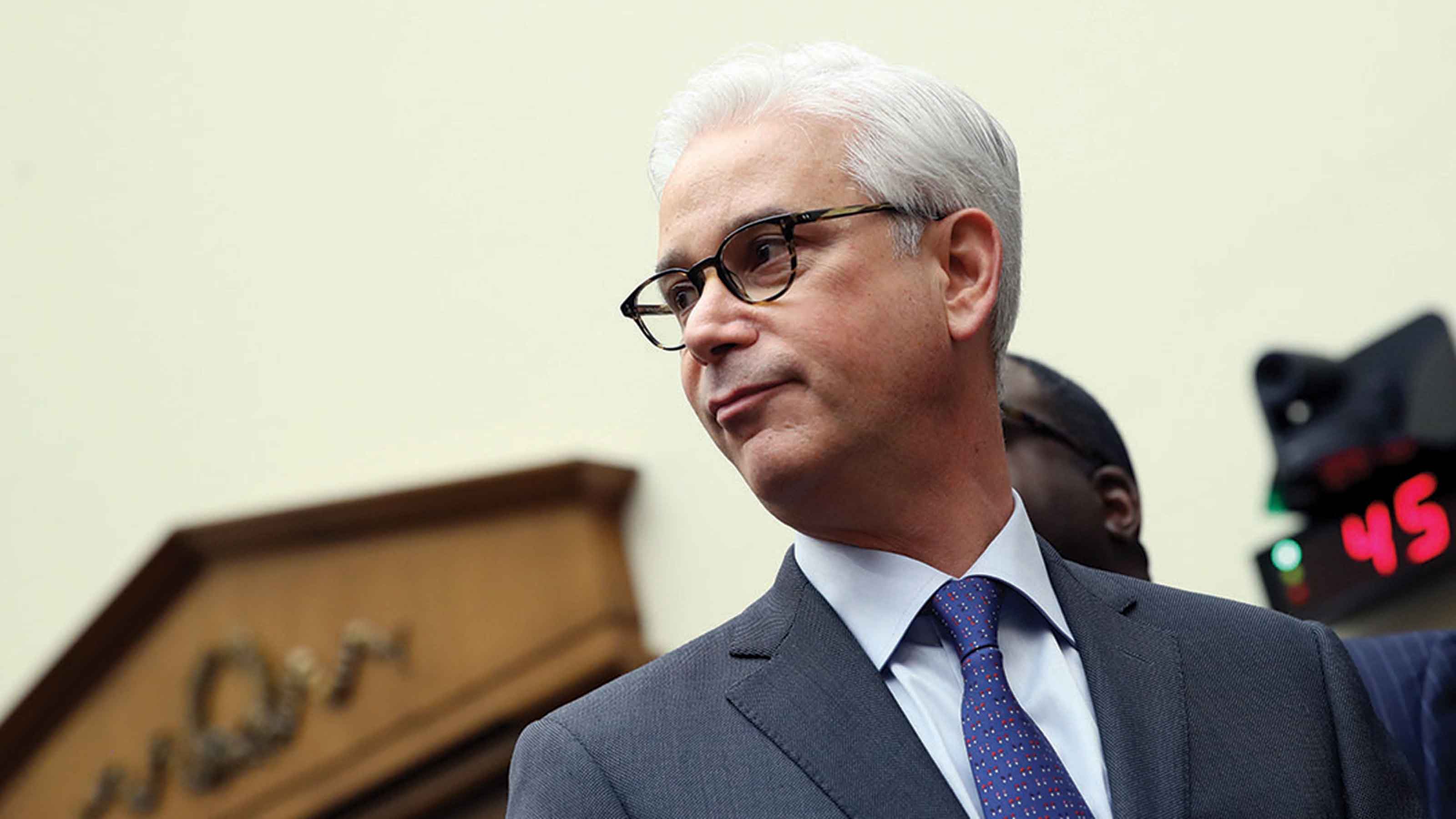Nothing Getting Done at Work? Blame Fantasy Sports
Today's forecast for management decisionmaking.
Profit and prosper with the best of Kiplinger's advice on investing, taxes, retirement, personal finance and much more. Delivered daily. Enter your email in the box and click Sign Me Up.
You are now subscribed
Your newsletter sign-up was successful
Want to add more newsletters?

Delivered daily
Kiplinger Today
Profit and prosper with the best of Kiplinger's advice on investing, taxes, retirement, personal finance and much more delivered daily. Smart money moves start here.

Sent five days a week
Kiplinger A Step Ahead
Get practical help to make better financial decisions in your everyday life, from spending to savings on top deals.

Delivered daily
Kiplinger Closing Bell
Get today's biggest financial and investing headlines delivered to your inbox every day the U.S. stock market is open.

Sent twice a week
Kiplinger Adviser Intel
Financial pros across the country share best practices and fresh tactics to preserve and grow your wealth.

Delivered weekly
Kiplinger Tax Tips
Trim your federal and state tax bills with practical tax-planning and tax-cutting strategies.

Sent twice a week
Kiplinger Retirement Tips
Your twice-a-week guide to planning and enjoying a financially secure and richly rewarding retirement

Sent bimonthly.
Kiplinger Adviser Angle
Insights for advisers, wealth managers and other financial professionals.

Sent twice a week
Kiplinger Investing Weekly
Your twice-a-week roundup of promising stocks, funds, companies and industries you should consider, ones you should avoid, and why.

Sent weekly for six weeks
Kiplinger Invest for Retirement
Your step-by-step six-part series on how to invest for retirement, from devising a successful strategy to exactly which investments to choose.
From The Kiplinger Letter, Sept. 5, 2014
With football season under way, office productivity may take a nosedive.The culprit: Fantasy sports leagues, which are poised for solid growth.Some bosses will try to block popular sports websites from office computer networks,but the efforts are likely to come to naught...workers will still use cell phones to play.Others will throw in the towel and create sanctioned office pools and fantasy leagues.
Fantasy sports, a $1.4-billion industry, will grow 7% annually till 2019.Leagues and TV networks promote them because they boost fan engagement,while advertisers want to reach young folks, who make up the biggest group of players.
From just $107.88 $24.99 for Kiplinger Personal Finance
Become a smarter, better informed investor. Subscribe from just $107.88 $24.99, plus get up to 4 Special Issues

Sign up for Kiplinger’s Free Newsletters
Profit and prosper with the best of expert advice on investing, taxes, retirement, personal finance and more - straight to your e-mail.
Profit and prosper with the best of expert advice - straight to your e-mail.
Slow Start for Small Business Health Insurance Exchanges
-- From The Kiplinger Letter, Sept. 5, 2014
Health insurance exchanges for small businesses will continue to sputter.They won’t be successful for at least several years, if at all. Enrollment datafor the few states that have released it shows participation in the low thousandsfor the Small Business Health Options Program (SHOP). There’s no federal data yet.
A big drawback: The plans offered by smalls usually have just one choice.There’s little incentive to use SHOP instead of buying through a private exchangethat offers coverage choices and other services...vision and dental care, for instance.(Other problems with SHOP: A time-consuming application process, tepid marketingand a slow start in educating employers and brokers who help them pick policies.)
Participation should go up a bit in 2015, when more states offer choicesto employees using SHOP exchanges. But 18 states won’t add choices until 2016.
The feds are focused on individual exchanges and see the overall declinein the number of uninsured Americans as the yardstick to measure their success.SHOP exchanges will always take a backseat to those larger, more visible programs
New Voting Laws Will End Up Before Judges
-- From The Kiplinger Letter, Sept. 5, 2014
An important player in elections this fall: Judges. New voting lawsthat could lead to mass confusion in 15 states on Election Day are under review.Among questioned provisions: Requiring photo identification or providing proofof citizenship…birth certificates or passports. The photo ID requirementsare the subject of legal challenges in Ark., N.C. and Texas. Also in legal limbo:Ohio’s decisions to shorten the early voting period and to end same-day registration.Backers say the laws will help prevent voter fraud. Foes say that fraud is rareand that laws are aimed at cutting turnout by minorities, who tend to be Democrats.
Recession, Deflation Loom for Eurozone
-- From The Kiplinger Letter, Sept. 5, 2014
There’s a strong chance the eurozone will slip back into recession this year.The lackluster yearlong recovery has stalled amid fears of deflation. Plus,output in the region’s manufacturing sector pretty much sputtered to a halt in Aug.Even Germany, which had been the eurozone’s economic success story for a while,saw its economy shrink by 0.2% in the last quarter. And there’s only a 50-50 chancethat it will avoid sliding into recession this quarter, which wraps up on Sept. 30.Pressure points include the conflict in Ukraine and the potential disruption in the flowof natural gas from Russia to much of Europe that could accompany an extended fight.
The European Central Bank cut interest rates again but is low on ammo.It’s unclear whether asset purchases in the works will spur a hoped-for lending surge.
The tepid reports from the 18-nation bloc will put a damper on global growth.Europe is a major destination for U.S. exports, including farm goods and machinery.
Turkey a Problematic Ally in Iraq, Syria Conflicts
-- From The Kiplinger Letter, Sept. 5, 2014
A key player as the U.S. mulls how to deal with rebels in Iraq and Syria: Turkey. The NATO ally is strategically valuable, as it borders both hot spots.It’s also a source of trouble, however: its porous borders allow foreign fightersto join Islamic State militants fighting government regimes in both countries.
But the new government in Ankara is causing angst in Washington.After 11 years as prime minister, Recep Tayyip Erdogan became president in Aug.His crackdown on protests last year included a failed effort to curb social media.
So just at the time the two governments need to be in sync, they’re at odds.As a result, the Senate isn’t in a hurry to confirm a new U.S. ambassadorto Turkey. Career diplomat John Bass is among dozens of nominees being held upby Republicans who have questions about Erdogan’s perceived authoritarian bent.He’ll be confirmed, but probably not soon enough to help deal with the IS rebels.
More Cops to Wear Body Cameras
-- From The Kiplinger Letter, Aug. 29, 2014
Look for sales of wearable police cameras to heat up. Inquiries are surgingin the wake of the Aug. 9 shooting death of teenager Michael Brown in Ferguson, Mo.Use of an on-body camera might have quickly confirmed or disproved the claimby a city police officer that he fired in self-defense after Brown charged at him.Adoption is buoyed by a number of factors, not just the high-profile case.
Price cuts have made cameras more affordable, with some costing as little as $400.And there’s potential to save legal costs of defending frivolous claims of wrongdoing.Some of the less than 10% of departments that use the cameras find fewer complaintsof police misconduct and less use of force by officers who wear the small recorders.Makers include Taser International, L-3 Mobile-Vision, Digital Ally and Pro-Vision.
Freelance Workers Will Get More Benefits
-- From The Kiplinger Letter, Aug. 29, 2014
Richer benefits are on tap for more freelance workers, whose ranks are risingeven as the economy heals. Many firms value them as lower-cost alternativesto regular, full-time employees. But to retain the best freelancers, more employerswill have to spring for disability and liability insurance, discounts on tax preparationand other perks given to regular employees, especially as more freelancers join unions.
The number of freelancers working in the U.S. figures to jump 40% by 2018,to 24 million vs. 2013’s 17 million. Younger workers who value mobility and flexibilityare especially drawn to the freelance lifestyle as opposed to traditional office jobs.And many of the employers doing the most hiring these days, such as high-tech firms,tend to use workers on a freelance or contract basis in short-term or specialized roles.
Poaching Crackdown Aimed at Defunding Terror
-- From The Kiplinger Letter, Aug. 29, 2014
Why is the U.S. spending millions to combat wildlife poaching in Africa? It’s all about stopping terrorists, not protecting elephants and rhinosthat are slaughtered for their tusks and horns. U.S. officials say the proceedsfrom selling the highly coveted parts in Asia are used to fund terrorist squadsin North Africa and to help underwrite the activities of organized crime factions.
The U.S. aid won’t end with money. Military gear is likely to be used: night vision goggles and helicopters to track poachers who hide in the dense bush.
The crackdown opens the door to opportunities for technology companiesto provide equipment such as transponders for ports and forensic tools to get DNAfrom confiscated ivory and narrow down where in Africa an elephant was killed.Even drones, to provide eye-in-the-sky intelligence about the location of poachers.
In time, the feds will set up high-tech enforcement networks in Asia, too.
Obama Threads Needle on Russia-Ukraine Dispute
-- From The Kiplinger Letter, Aug. 29, 2014
Obama will stay on middle ground in dealing with Russia and Ukraine,between isolationists and those who want the U.S. to stand up to Moscow.Calls for engagement are growing. Even some members of his White House teamsee Russia’s stepped-up aggression as tantamount to an invasion that requires action.
He’ll stick to sanctions and allow NATO to play bad cop in the region.NATO will start next week with approval of a permanent rotating force near Russia’s western border. But the troops, seen as a deterrent, aren’t likely to fight.
Backyard Chickens May Give You Fleas
-- From The Kiplinger Agriculture Letter, Aug. 22, 2014
Hens in the backyard? Besides fresh eggs, they can also produce fleas.Veterinarians say they’re seeing an uptick in poultry fleas among the parasitesthat plague household pets. And unlike more common pet fleas, the avian varietyburrows into the skin of dogs and cats, which can lead to infections. Infested sitescan be treated with a permethrin solution. For treating animals, consult a vet.
U.S. Farmers to Benefit from Wider Suez Canal
-- From The Kiplinger Agriculture Letter, Aug. 22, 2014
Expansion of the Suez Canal will help U.S. shippers of ag products,primarily items sent in containers. U.S. farmers who sell corn oil, seeds, almonds,walnuts, pistachios and other nuts in the Persian Gulf region and southern Asiawill see speedier transits through the canal once Egypt is able to finish the project.Also benefiting: U.S. sellers of farm equipment and compressed alfalfa hayfor feeding camels, goats, sheep and horses in the desert climes of the Middle East.Egypt is striving to open a second channel, at least 22 miles long, in a year or so.Western Europe, Ukraine and others that deliver bulk grain via the Suez will gain, too.
Powdered Alcohol? States Say No
-- From The Kiplinger Letter, Aug. 15, 2014
States are balking at powdered booze. Even if the federal government OKs it,some states will ban it as too alluring for kids. Many opponents say that Palcohol,when mixed with water, is essentially spiked Kool-Aid. Maker Lipsmark wants approvalfrom Treasury’s alcohol and tobacco tax arm and hopes to get powdered vodka, rumand four specialty drinks on store shelves by fall. But the feds will tread carefully.
Fair odds New York, Minnesota, maybe Ohio will ban it, as Alaska, South Carolina and Vermont have.
Ranchers, Meat Packers May Resist New Beef Grading
-- From The Kiplinger Agriculture Letter, Aug. 22, 2014
The Department of Agriculture is poised to reexamine how it grades the quality of beef products.Ranchers, feedlot owners, meatpackers and consumer advocates will get to weigh inbecause the standards affect prices of cattle along with wholesale and retail beef.
The USDA says revisions in the current standards, in place for nearly half a century,are needed because cattle are different now. They’re larger than they used to be,for example, with carcasses usually 800-900 lbs…50% heavier than back in the ’60s.Also, feeding regimes (grain- vs. pasture-fattened) have altered consumer preferences.But packers and ranchers haven’t called for changes and may not accept any quickly.
Obama Labor Orders Irk Business Groups
-- From The Kiplinger Letter, Aug. 15, 2014
Business groups say a planned crackdown on U.S. contractors is too broadand will hurt some vendors and others who indirectly work with Uncle Sam.It’s the latest bid by Obama to appease unions, a big Democratic constituency.At issue: Executive orders by Obama to police firms that do federal workon everything from pay…including overtime and fair wages…to worker safety.They call for tough new rules aimed at barring repeat offenders from federal work.
Opponents say even lawful businesses will be harmed by the ordersbecause of confusion about who is covered and the cost of complying with them.The U.S. Chamber of Commerce and National Federation of Independent Businesssay that minimum wage provisions in one of the orders could apply to outletsthat sell fast food on military bases or to firms that lease space in federal buildings.The wage is to go to $10.10 per hour effective with new contracts beginning Jan. 1.
Creative Efforts to Stem Golf's Decline
-- From The Kiplinger Letter, Aug. 15, 2014
No quick recovery in sight for golf’s popularity...bad news for course owners,equipment makers and other businesses that cater to golfers. Amateur playis declining as fewer golfers hit the links or do so less frequently. Also ebbing:Fan enthusiasm for the pro game. TV viewership of the 2014 Masters tournament…the most watched golf event of the year…netted its smallest audience in two decades.
Many golf course owners will have to get creative to avoid closing up shop.Expect a heavy emphasis on youth programs and lessons to draw in future customers.And don’t be surprised if your local course starts sponsoring “footgolf,” a hybrid sportplayed with a soccer ball on golf courses. More than 140 courses already offer itto boost revenue from underused facilities…and hopefully spark new interest in golf.
Education Gives Women Edge at Finding Jobs
-- From The Kiplinger Letter, Aug. 15, 2014
Women are winning the race on regaining jobs lost in the Great Recession... more women employed now than at their previous peak in Nov. 2007. Men are still 643,000 shy of their earlier jobs peak. Why the gender disparity? One reason: Many new jobs are in business and professional services, education and health...fields that put a premium on educational attainment, where women have an edge.
Growth in Canada, Mexico Accelerating
-- From The Kiplinger Letter, Aug. 15, 2014
In Canada, healthy consumer spending and rising exports spell better growththis year…about 2.2%...with a 2.5% gain likely next year. In 2013, GDP grew just 2%.
South of the border, an energy boom is propelling the Mexican economy…about a 2.3% jump this year, with a robust 3.5% expansion in the cards for 2015.The recent move by the Mexican government to let foreign and domestic companiesexplore for and refine oil will spur Pemex, the country’s state-owned oil enterprise,to become more competitive, boosting growth. (The oil industry accounts for about 6%of Mexico’s GDP.) Plus, home building is perking up, and manufacturing is getting a liftfrom the rebound in U.S. and Canadian consumer demand after a dismal winter.
That’s good news for U.S. businesses. The North American neighborsare the U.S.’ top two foreign customers, accounting for $500-billion-plus in exports.
New Rules Will Clear Up Phone Bills
-- From The Kiplinger Letter, Aug. 15, 2014
Easier-to-read wireless phone bills are in the cards. A federal crackdownon mobile cramming…the practice of charging hidden or unauthorized fees on bills…is leading carriers to adopt new, voluntary measures to make bills more transparent.Such fees include charges for ringtones, horoscopes, weather forecasts, etc.,from third-party marketers that give carriers a cut of the profits. In recent years,wireless carriers have reaped hundreds of millions of dollars from such services.
The threat of stricter billing regs from the FCC lurks in the wings,spurring both carriers and marketers to clean up their acts to avoid paying finesand even the possibility, though remote, of an outright ban on third-party charges.
Well-Funded ISIS Rebels Will Be Hard to Defeat
-- From The Kiplinger Letter, Aug. 15, 2014
The ISIS rebels in Iraq can be contained, but it will take months or yearsbecause of the hit-and-hide nature of their attacks and the U.S.’ reluctanceto send ground troops back to the troubled territory. Instead, airstrikes will continue,and Britain will join the U.S. and France in arming the Kurds in northeastern Iraq.
The rebel forces aren’t vast, and much of their military gear is ancient.But they have billions of dollars on hand to buy weapons and train recruits.And the porous border between Iraq and Syria allows them to come and go freely.
Tablets Toughen Up for Challenging Workplaces
-- From The Kiplinger Letter, Aug. 8, 2014
More companies will turn to rugged tablets to battle tough work conditions.The mobile devices are designed to tolerate falls, water and extreme temperatures.The bulked-up versions have Microsoft Windows, Intel chips and simple touch screens,making it easy for IT departments to integrate them with companies’ other hardware.
Look for sales to grow by 16% a year through 2017. Eager to buy: Firmsin construction, oil & gas, public safety and the military. Commercial drone users, too.
Obama's Immigration Moves May Hurt Democrats
-- From The Kiplinger Letter, Aug. 8, 2014
The big shock in President Obama’s next move on illegal immigrants?Not that he’ll block some deportations by executive order, but the timing.He’s likely to take the contentious step before this fall’s congressional elections,when Democrats face a stout challenge to maintain a majority in the Senate.
That’ll frustrate those Democrats who want him to stall any actionuntil after the midterm elections, when control of Congress will again be at stake.Millions of illegals who have been in the U.S. for a while will be allowed to stay.
Acting before November could hurt Democrats trying to win key Senate seats.The move will inflame conservatives in such states as Ark., Ga., La. and N.C.If their anger translates into more of them voting, Republicans will stand to gain.Many Hispanics will be energized, too, but the eight or so states with key racesdon’t have Hispanic populations large enough to alter Election Day results.
Obama isn’t likely to order a boost in the number of high-tech visas,despite widespread support in the business community. A shortage of workerswith math and science backgrounds and a long wait for visas hamper firms.
Small Firms Will Keep Expanding Payrolls
-- From The Kiplinger Letter, Aug. 8, 2014
Look for the gradual pickup in hiring by small business to last into 2015.Businesses with 50 or fewer employees are sounding increasingly confidentthat climbing revenues will justify expanded payrolls. And it’s no longer just in areasof the country buoyed by the energy boom. Smalls in Seattle, Detroit and San Diego,for example, are also beefing up their workforces. Moreover, service industries…from accounting firms to restaurants…are posting some of the biggest hiring gains.
About 13% of small firms say they plan to add workers…the 10th monthin a row that more smalls aimed to hire than to cut back. And, since small firmsmake up the majority of employers, that’s good news for communities across the U.S.
Ebola Vaccine Coming, But Drug Firms Uninterested
-- From The Kiplinger Letter, Aug. 8, 2014
An Ebola vaccine is in the works, but it won’t be ready till mid- to late 2015.Animal testing and upcoming human tests are being funded by Uncle Sam.Drug firms aren’t interested...there’s little chance of a big return on investmentbecause outbreaks are sporadic and relatively few people come down with the illness.
But here’s good news on the health front: All signs point to a mild flu season.Getting the shot can reduce the chance of needing a doctor visit by 60%...great news for employers that offer shots in the office or pay for workers to get them.Among workers aged 50 to 64, the flu is responsible for nearly half of lost workdaysand days of low production. The price tag for all that lost productivity: $6.2 billion.
Safety of a Dam Will Drive U.S. Iraq Policy
-- From The Kiplinger Letter, Aug. 8, 2014
U.S. airstrikes against ISIS rebels in Iraq will continue on and off for months.Obama insists he won’t send ground troops, but he might not have a choice.If the rebels destroy a massive dam they now control, Baghdad will be flooded,presenting the president with one of the biggest challenges of his White House tenure.Ground forces would likely be needed to protect U.S. citizens and American facilities.
Smart Watches' Time Has Come
-- From The Kiplinger Letter, Aug. 1, 2014
The hot new electronic gadgets this holiday season as well as next year?Smart watches from Apple, Samsung, LG Electronics, Pebble and others.Google also licenses a smart watch operating system used by Motorola, Samsungand other watchmakers. Prices of new watches will likely range from around $150to as much as $1,000 for ones with lots of computer power, memory and sensors.Partnerships with top-end watchmakers such as Rolex will lead to even higher prices.Worldwide shipments of smart watches are expected to hit a whopping $3.6 billionin 2015, a more than 20-fold increase from the shipments of such gadgets last year.
Casino Market Increasingly Saturated
-- From The Kiplinger Letter, Aug. 1, 2014
Additional casinos won’t bring states more gambling bucks. The marketis saturated, especially in the Northeast, and expansion in one statesimply cannibalizes business in another. Atlantic City, N.J., revenues, for example,have dropped 45% since 2006 as N.Y. and Pa. gained business, while newer casinosin Pa. take dollars from N.J. and Del. With casinos legal now in all but 10 states,853,000 slot machines nationwide and more splashy Vegas-style resorts opening in N.Y., Mass., Md. and Ohio, the $37-billion pie will be split into smaller slices.
Meanwhile, online betting is proving a disappointment for Nev., N.J. and Del.,the only states where it’s legal. N.J. has raked in just $9 million so far this year;it was banking on a $180-million haul from online betting. The market as a wholeis likely to nab just $3.5 billion from 2013-2016, down from an expected $5 billion.
Brighter prospects further down the road, though, as new gambling appsare rolled out and more folks turn to using their smartphones to take their chances.
Gas Prices Will Continue to Fall This Year
-- From The Kiplinger Letter, Aug. 1, 2014
Expect friendlier gasoline prices for the remainder of 2014. Ample suppliesand restrained demand have already caused the average price of regular gasto decline from the peak of about $3.70 per gallon reached in June to $3.50 today.Pump prices will slip a few cents more in coming weeks and decline even furtherafter the Labor Day holiday weekend. Figure on an average of $3.30 per gallon by Dec.For the full year, prices will average a dime or so per gallon less than 2013’s $3.51.
Ditto for diesel, which will ease from $3.84 per gallon now to $3.80 by winter.
Rising crude oil output and busy refineries will keep markets well supplied.U.S. refinery output is setting records, thanks to more low-cost domestic crudeand more refining capacity. Current U.S. oil production of 8.4 million barrels per daywill keep expanding, to 9 million barrels per day by year-end…the most since 1986.
Eager Back to School Shoppers Will Find Few Discounts
-- From The Kiplinger Letter, Aug. 1, 2014
Retailers can expect healthy sales this back-to-school season. Total salesfigure to come in at $590 billion, topping 2013’s figures by 4%. Families with childrenin grade school will spend $670 on average, mostly at department and discount stores.But bookstores and electronics retailers will also get in on the action…laptops, tabletsand other digital devices are increasingly seen as school necessities, not luxuries.
Shoppers seeking hot deals will be out of luck. Retailers won’t drop pricesto nab sales...profit margins are too slim. So many buyers will turn to store brandsto find savings over brand-name counterparts. And a quarter of families will hold offuntil late August or early September to shop, hoping for late-season sales as classes begin.
China Seeks More Moderate Growth
-- From The Kiplinger Letter, Aug. 1, 2014
Look for China’s economic growth to slow more markedly in the years ahead.Gains will drop to around 6% by 2016, from 7% next year and about 7.3%this year…a far cry from double-digit average annual growth of the previous decade.
The fact is, bad loans are on the rise, curtailing the supply of credit,particularly from nontraditional lenders such as trust companies. Moreover,falling real estate prices are taking a toll on construction activity and sales,further weakening the business investment that has helped stimulate past growth.
But the slowdown is OK with Beijing. Officials figure that more-sustainable,albeit moderate, growth is preferable to additional, riskier credit-fueled expansion.Plus the government wants home prices to slide, making homes more affordablefor average families. Ditto for rents to fill new, but unoccupied, apartment buildings.
Still, officials will watch employment levels closely. A sharp accelerationin joblessness would see them step in quickly to prevent widespread social unrest.
Custom Web Sites for Even the Smallest of Firms
-- From The Kiplinger Letter, July 25, 2014
Website-building services are targeting a new client list: Entrepreneurs.Start-ups are eager to quickly and cheaply create a sharp-looking Internet presence.They can get basics from plug-in programs, but those provide cookie-cutter websitesthat don’t stand out. The custom creators allow them to have a first-rate Web servicewithout devoting time or resources to writing lines of cumbersome code on their own.Once used primarily by bloggers, the services are gaining acceptance from retailers.
Small businesses stand to benefit the most. A majority of those operationsaren’t on the Web. Even fewer of them have mobile sites designed for smartphones.Fees, including online stores: About $25 a month for Weebly, Wix and Squarespace.The sites track order history, keep tabs on inventory and sell digital downloads.
Millennials Itchy to Move into Their Own Place
-- From The Kiplinger Letter, July 25, 2014
Lots of pent-up demand for apartments from millions of 18- to 34-year-oldslooking for a way out of their parents’ basements. About 22.4 million of them still live at home…3.3 million more than the long-term average for that age group.The vast majority of this population group rents a first home rather than buying. So...
That will soak up the surge of new units this year: Up to 240,000 of them,vs. only 160,000 in 2013. With vacancy rates as low as 2.6% in New York City, 3.2%in San Diego and 4.4% for the nation overall, landlords will be able to jack up rents.Figure on hikes averaging 3% per year over the next several years, just off 2013’s rate.
Expect building to level off or retreat slightly in 2015 as investors pauseto assess whether the pickup in the economy is strong enough to fill even more units.
Employers to Boost Bonuses in 2015
-- From The Kiplinger Letter, July 25, 2014
Bonuses for workers will be popular in 2015 as employers of all sizes tryto retain talent as the economy improves and competition for workers grows.Employers are offering more and bigger signing bonuses as well as awarding bonuseson the spot to recognize excellence during the year. Rewards, too, for employeeswho refer successful candidates, achieve longevity or reach other milestones.
Also growing in popularity: Nonfinancial rewards…extra opportunitiesfor career development, education, time off, more-flexible work hours and the like.Many workers consider such things to be more valuable than some extra cash.
Record Year for Natural Gas Production Ahead
-- From The Kiplinger Letter, July 25, 2014
More gains ahead for natural gas reserves and output as drillers tap depositsassociated with oil locked in shale rock and produce gas as a by-product.Though the number of rigs drilling for gas is declining, output is up 5% over last year.
Another record-setting year of production is all but certain. For the full year,figure on about 31.5 trillion cubic feet of gas…up from 2013’s 30.2 trillion cubic feet.That should help rebuild gas stocks vastly depleted by last winter’s frigid weather.
Obamacare Subsidies Appear Immune to Court Challenges
-- From The Kiplinger Letter, July 25, 2014
About reports that court rulings will wound Obamacare, maybe fatally:They’re premature at the least. And probably are vastly overstated.Only one ruling has gone against the legality of subsidies for insurance boughtthrough the federal exchange instead of state-run exchanges. And that ruling, by a three-judge appellate panel in Washington, D.C., seems ripe for reversalwhen the Obama administration asks the full 11-judge court to rehear the case.Rulings by other federal courts have upheld the health insurance subsidies.
If the full court allows the subsidies and other courts don’t take differing views, the Supreme Court isn’t likely to weigh in. The justices usually pick casesin which the law needs to be clarified or a constitutional issue needs to be settled.
But in the end, even a negative ruling from the Court wouldn’t be fatal.Governors and state lawmakers in the 36 states that rely on the federal exchangewould face immense pressure from voters and insurers to open state exchanges.Not all 36 oppose state programs. They just took the easier path under the law.
Tighter Security for Mobile Devices
-- From The Kiplinger Letter, July 17, 2014
Coming soon: Better protection against hacking that targets mobile devices.Banks and technology developers won’t wait for serious breaches to occur. Instead,within two years, they’ll roll out more advanced techniques to verify account users.
First in line: Fingerprint recognition, making it pointless to steal passwordsand usernames. Voice recognition may also help beef up authentication efforts.Education will be a priority, too, starting next year. Mobile users will be warnedabout the dangers of “jailbreaking” their phones…altering hardware and softwareto allow uses outside those set up by the manufacturer. The practice is commonand adds flexibility. But it voids warranties and can compromise data protectionby circumventing built-in security provisions that keep hackers and malware away.
Profit and prosper with the best of Kiplinger's advice on investing, taxes, retirement, personal finance and much more. Delivered daily. Enter your email in the box and click Sign Me Up.
-
 5 Vince Lombardi Quotes Retirees Should Live By
5 Vince Lombardi Quotes Retirees Should Live ByThe iconic football coach's philosophy can help retirees win at the game of life.
-
 The $200,000 Olympic 'Pension' is a Retirement Game-Changer for Team USA
The $200,000 Olympic 'Pension' is a Retirement Game-Changer for Team USAThe donation by financier Ross Stevens is meant to be a "retirement program" for Team USA Olympic and Paralympic athletes.
-
 10 Cheapest Places to Live in Colorado
10 Cheapest Places to Live in ColoradoProperty Tax Looking for a cozy cabin near the slopes? These Colorado counties combine reasonable house prices with the state's lowest property tax bills.
-
 Airbnb Host Tells What It's Like
Airbnb Host Tells What It's LikeBusiness Costs & Regulation This Denver pharmacist began booking her ski condo a few months after the pandemic hit.
-
 Tough Times for a Family Business
Tough Times for a Family BusinessBusiness Costs & Regulation His dry-cleaning operation was rocked by the pandemic, but he is staying optimistic.
-
 IRS Gives Truckers a Tax Break in Response to the Colonial Pipeline Shutdown
IRS Gives Truckers a Tax Break in Response to the Colonial Pipeline ShutdownTax Breaks The tax penalty for using dyed diesel fuel for highway use is temporarily suspended.
-
 Reliving a Harlem Renaissance
Reliving a Harlem RenaissanceBusiness Costs & Regulation After a tough winter, two sisters look forward to reviving their restaurant’s business.
-
 Add a VPN to Surf the Internet Safely
Add a VPN to Surf the Internet SafelyTechnology To help you fight identity theft, consider adding a VPN.
-
 Stephanie Creary: Making the Case for Diversity on Corporate Boards
Stephanie Creary: Making the Case for Diversity on Corporate BoardsBusiness Costs & Regulation Adding underrepresented voices can improve a company’s bottom line.
-
 How We Lose When We Overlook Black Talent
How We Lose When We Overlook Black TalentBusiness Executives Comments from Wells Fargo CEO Charles Scharf (pictured) reflect a culture that tramples on clients’ trust and limits opportunities for people of color.
-
 Retirees, Create An Emergency Fund for Rental Property
Retirees, Create An Emergency Fund for Rental PropertyBusiness Costs & Regulation Build a cushion to protect your income from an unforeseen crisis.